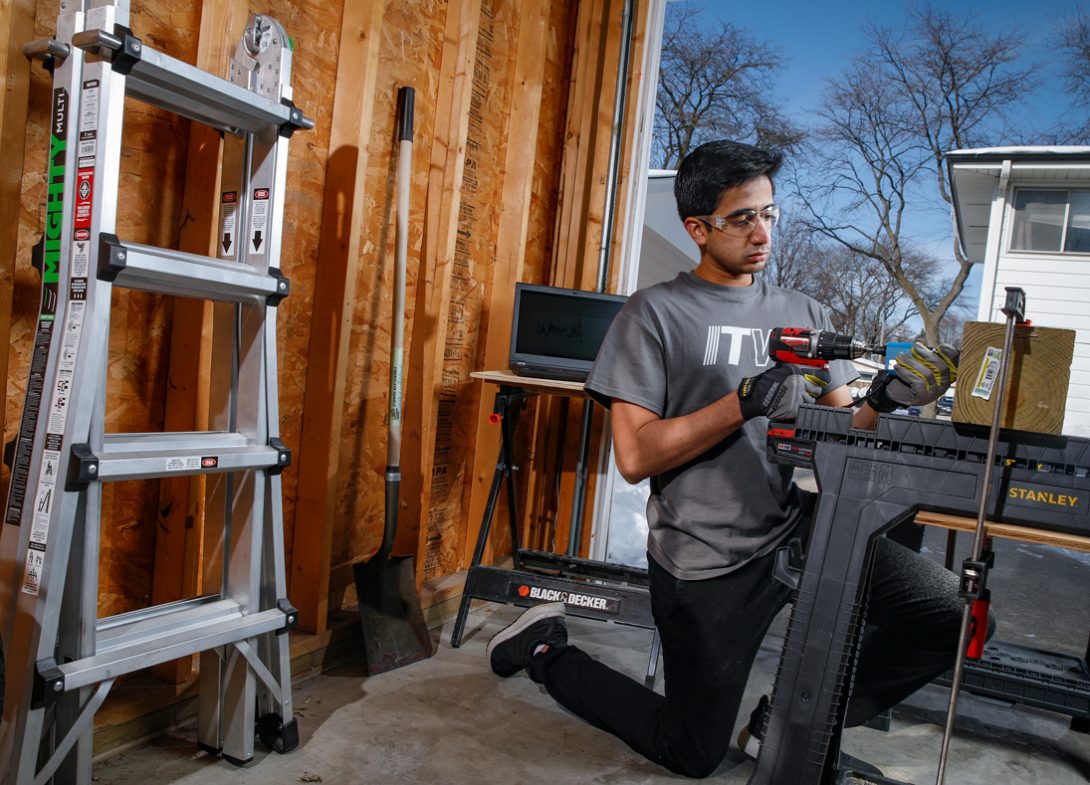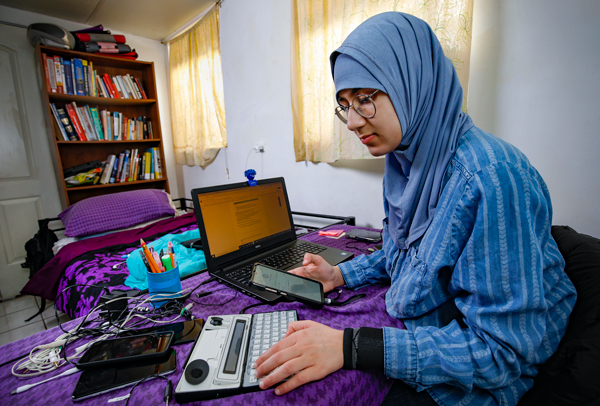The art of home work
What we learned when internships went virtual
By Kirsten Janson
1

When Khateeb Raza interviewed for an internship at Illinois Tool Works in March 2020, the state of the world was becoming anything but normal. One thing that clued him in: the way his interviewer greeted him. “I just won’t shake your hand,” she said.
For Raza, a mechanical engineering major at UIC, that unusual interaction was the start of an unanticipated undertaking in gaining industry knowledge from home. He got the internship but found that his position would be entirely virtual. It’s an experience shared by most college students who held internships during the first year of the coronavirus pandemic.
What was it like to be an intern without spending time at a work site? What were the similarities and differences in students’ experiences, the pros and cons? Will the advent of this model change the course of internships going forward? We talked to students and employers who participated in this unintended experiment to find out.
Here are four things we learned.
1. People still need people.
Many companies decided to cancel internships in 2020: according to Glassdoor, intern hiring was down 49 percent in May 2020 compared with the same time in 2019. Other firms pressed ahead with their internship programs and focused on reinventing them. Those that did found themselves on entirely new ground.
“We had never created a remote internship curriculum prior to the pandemic,” said Jessica Cruz, early careers team manager at Relativity, a Chicago-based software company whose internship program is key to its talent pipeline. “The experience really happens in the office.”
That statement will ring true to a group of UIC engineering and computer science alumni: over the last three years, Relativity has hired 24 UIC students as interns and counts 75 UIC alumni among its full-time staff, including Cruz herself.
To transform Relativity’s internship program into a successful virtual one, Cruz and her colleagues concentrated on ensuring that their interns felt connected. “We wanted to facilitate them building their network and give them some of that activity that they were missing out on while being virtual,” she said. They added new training sessions for managers and incorporated informal meetings so that interns could meet full-time employees outside of their teams. “A lot of the research we found showed that student interns aren’t always comfortable reaching out to their team members, especially if they’ve never met them,” Cruz noted.
That sentiment resonated with Bharat Middha, a UIC computer science major who held two internships with Microsoft, one in person and the other from his apartment. Had the remote internship been his first, “I would have had a lot of issues just trying to get to know people,” he said. “It’s not the same as walking around the hall and just knocking on someone’s door.”
1
It would have been amazing if I had that feeling for 10 weeks of what it’s like to be in my own space at work.
2
All the remote interns interviewed for this story said they missed those casual in-person interactions, but they found surprising benefits, too.
“Networking was easier, oddly enough—you could reach out to people in other areas of the company and other locations,” said Daniela Quinonez, BS ’20, who was an intern at Northrop Grumman before returning to UIC to start a master’s in mechanical engineering last fall.
Arpita Kumari, a computer science major who completed a remote internship at CNA Insurance, said her supervisors organized coffee talks for networking, virtual social events with peers, and daily scrum calls to replicate what would happen in the office. Those interactions were crucial to making the experience feel as normal as possible. “It wasn’t like starting off the day alone sitting in a room,” Kumari recalled. “I got to see everyone’s faces and got to see what everyone was working on.”
2. Some projects changed. Others stayed the same.
If interpersonal connection was a common theme among the interns we talked to for this story, the effect of virtual work on their assignments is where things diverged.
Hands-on engineering work challenged companies to recast projects for the remote setup. Quinonez’s internship, for example, was supposed to have been about power conversion technology. But “that’s a lot of testing on the bench,” she noted. She ended up doing data flow programming instead.
Raza’s position at ITW involved testing a line of screws and comparing a new fastener’s performance against competitor products. He and his supervisor found ways to make it work remotely. Some of Raza’s equipment came via mail, and he bought other products he needed at Home Depot. Every day, he reported to a workbench he had set up in his backyard. He only needed to go to an ITW facility twice to complete the tests.
Students whose internships didn’t need more than a laptop—especially in computer science—experienced no change in their intern assignments. Middha worked on Microsoft’s SharePoint team, modernizing its code base and reprogramming old features for better security, reliability, and testing. At Relativity, interns worked on the same tasks they would have in the office: fixing software bugs or programming new features for an app to improve its functionality.
Even if a task translated seamlessly, however, remote work could bring challenges. Kumari’s internship involved coding using paired programming, in which two people work together, typically sharing monitors side-by-side, to write code. “Sometimes it lags, or there’s a connection issue, or the person can’t see where your cursor is,” she said. Kumari said it’s more fun in person, too: “In the beginning stages of coding, we’d have a whiteboard and then write using colorful markers.”
3

3. You can’t take the water cooler home.
Employers simulated the internship experience as best as they could, but some students still craved a physical immersion in workplace culture.
Dua Shehadeh, an electrical engineering major who was an intern with U.S. Cellular, loved her internship but really had wanted the corporate experience. Going into the office for a few days confirmed what she was missing. “For the four days I was there, I was able to see the office, see everyone’s cubicle,” she said. “It would have been amazing if I had that feeling for 10 weeks of what it’s like to be in my own space at work.”
That’s a downside perceived by Hereford Johnson, BS ’16, MS ’19, who managed an intern at the private equity firm where he himself is an MBA-level intern: the firm wasn’t able to offer the same level of exposure. “It’s not the same virtually to see what it’s really like to work at the firm full-time and what the day-to-day would look like,” he said.
Students also expressed concerns about being able to make a meaningful impression when you’re at a remove from the office. “It’s a bit challenging to build your identity and show who you are virtually versus in person,” Kumari said.
4. We don’t know if remote internships are here to stay.
What if the events of 2020 cause a shift in how internships themselves work?
At Relativity, this year’s internship program will remain fully remote, but Cruz’s team is planning a hybrid model for 2022 that will split interns’ hours at home and on-site. “We were able to see that they’re definitely productive at home,” she said. At CNA, Kumari’s team finished their code in record time, perhaps working efficiently knowing that their internship had been curtailed by a few weeks. “They were astonished with what we accomplished,” she said. Shehadeh’s supervisor at U.S. Cellular, Joselito Aggari, said he’d never had a student complete as many projects as she did.
Shehadeh wonders if some of her success came simply from having more time. Had she needed to commute, she would have had to wake up at 6 a.m., take the Blue Line train, and then take a car ride from O’Hare to the office. “That element of being able to just wake up and get ready for meetings in my own space really helped.”
Regardless of what happens in the future, students said their remote work experiences were successful overall. Shehadeh landed a job at Lockheed Martin because of the experience she gained at U.S. Cellular. Raza was offered a full-time position at ITW. Middha starts at Microsoft this May. Kumari accepted an offer with CNA. Quinonez said her remote internship at Northrop opened up new possibilities, with the unexpected switch from power conversion to coding leading her to adjust her master’s coursework: “I would say it was my best one in the three years I’ve been with them.”
Aside from getting jobs or discovering new career paths, remote interns still were able to gain the all-important advantage of work experience.
“Understanding all of the things in the textbook is totally different from having to actually apply it and then have people depend on you for results,” Raza said. “That was something I hadn’t experienced before, so even though it wasn’t in-person, I’m just really grateful it happened.”